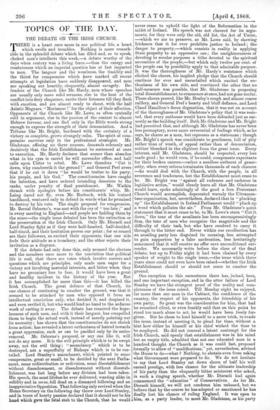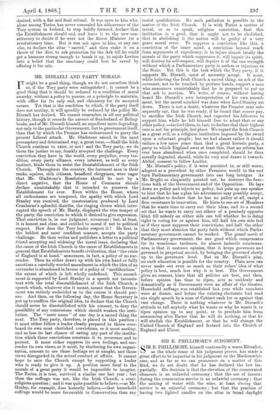TOPICS OF THE DAY.
THE DEBATE ON THE IRISH CHURCH.
THERE is a heart once more in our political life, a heart which swells and trembles. Nothing is more remark- able in the splendid debate which has filled and, so to speak, choked men's intellects this week,—a debate worthy of the days when oratory was a living force,—than the energy and resoluteness which an imperial question has at last imparted to men. The languor and the weariness, the timidity and the thirst for compromise which have marked all recent attempts at legislation have suddenly disappeared, and men are speaking out heartily, eloquently, almost savagely. De- fenders of the Church like Mr. Hardy, men whose speeches are usually only more solid sermons, rise in the heat of the conflict into fiery eloquence, excite their listeners till they flush with emotion, and are almost ready to shout, with the half Asiatic Magyars, " Moriamur !" for the object of their affection. Opponents of the Church like Mr. Lowe, so often cynically cold in argument, rise in the passion of the contest to almost Hebrew fervour, and can find only in the Bible words strong enough to express the strength of their denunciation. And a Tribune like Mr. Bright, burdened with the certainty of a victory so complete, grows strangely calm. The spirit of com- promise survives only in the professional strategist. Mr. Gladstone, offering no three courses, demands solemnly and decisively that the Irish Establishment be sentenced at once to execution. Mr. Hardy declares that sooner than abandon what in his eyes is sacred he will surrender office, and half calls upon Ulster to rebel. Mr. Lowe thunders "Cut it down, why cumbereth it the ground ?" and General Peel avers that if he cut it down "he would be traitor to his party, his people, and his God." The constituencies have caught the infection, and have ordered intending deserters to the ranks, under penalty of final punishment. Mr. Watkin shrank with apologies before his constituents' whip, Mr. Laing dared not fly, even Mr. Roebuck, with his trained hardihood, ventured only to defend in words what he promised to destroy by his vote. The single proposal for compromise, Mr. Bernal Osborne's, was met with the cry of "too late ;" and in every meeting in England—and people are holding them by the score—the single issue debated has been the extinction or the preservation of the Irish Church. Only Mr. Disraeli and Lord Stanley fight as if they were half-hearted, half-decided, half-timid, and their hesitation proves our point ; for so roused are their followers, so excited their opponents, that one side feels their attitude as a treachery, and the other rejects their invitation as a disgrace.
If the debate had only done this, only aroused the electors and the members once more to the conviction that political life is real, that there are votes which involve careers and questions which are principles, only made men eager for a victory not involving material interests, and bitter when they have no pecuniary loss to fear, it would have been a great and healthy incident in the history of the year. But it has accomplished far more than this—it has killed the Irish Church. The great defence of that Church, its one chance of continuing to cumber the ground, was that it seemed to be attacked by men who opposed it from an intellectual conviction only, who derided it, and despised it, and even reviled it, but who would lend no hand to the arduous work of carting it away. The debate has removed the hope- lessness of such men, and with it their languor, has compelled them to begin the actual work, instead of merely pointing out its necessity ; has shown that the constituencies do not shrink from action; has revealed a latent enthusiasm of hatred towards a great oppression, such as can be pacified only by its entire removal. Mr. Osborne's proposal, or any one like it, will not do any more. It is the evil principle which is to be swept away, not the evil thing ; " ascendancy " which is to be
destroyed, not a superfluity of Bishops which is to be cur- tailed. Lord Stanley's amendment, which pointed to some compromise, great or small, to be decided by the next Parlia- ment, some redistribution or redivision, some disestablishment without disendowment, or disendowment without disestab- lishment, was lost long before any division had been taken. His speech, the most lifeless he ever delivered, wanting alike in solidity and in verve, fell dead on a dismayed following and an inappreciative Opposition. That following only revived when the Home Secretary on the following day threw over Lord Stanley, and in tones of hearty passion declared that it should not be his hand which gave the fatal stab to the Church, that he would never cease to uphold the light of the Reformation in the midst of Ireland. His speech was not cheered for its argu- ments, for they were only the old, old list, the Act of Union, —which we are to preserve, as Mr. Lowe said, by showing Irishmen that it for ever prohibits justice to Ireland ; the danger to property,—which consists in reality in applying State property to an oppressive use ; the unrighteousness of devoting to secular purposes a tithe devoted to the spiritual necessities of the people,—but which only twelve per cent. of the people can by possibility apply to that admirable purpose. It was the thoroughness of Mr. Hardy's resistance which elicited the cheers, his implied pledge that the Church should continue for ever and uncurtailed which excited the en- thusiasm of his own side, and convinced the other that no half-measure was possible, that Mr. Gladstone in proposing total disestablishment, to commence at once, had not gone toofar.. Those cheers proved, like Mr. Henley's rough and almost coarse raillery, and General Peers hearty and bluff defiance, and Lord Claud Hamilton's fierce dogmatism, that it was not on account, of the thoroughness of Mr. Gladstone's policy that it was resis- ted, that every outhouse would have been defended just as ear- nestly as the building itself. Both Mr. Gladstone and Mr. Bright had perceived that, and although Mr. Gladstone has never been less peremptory, never more reverential of feelings which, as he- says, he shares as a man, but represses as a statesman ; though Mr. Bright's speech was considerate to gentleness, full of pity rather than of wrath, of appeal rather than of denunciation, neither blenched in the slightest from the great issue. Every interest, said Mr. Gladstone, should be respected, every loss- made good ; he would even, if he could, compensate expectant& for their broken careers—rather a needless outburst of gener- osity, when every reform terminates thousands of such chances —he would deal with the Church, with the people, in all reverence and tenderness, but the Establishment must cease to. be. Mr. Bright was "against all rudeness and rashness in legislative action," would clearly leave all that Mr. Gladstone would leave, spoke admiringly of the good a free Protestant Church would accomplish, deprecated warmly the Ultramon- tane organization, but, nevertheless, declared that in "plucking up" the Establishment in Ireland Parliament would "pluck up. a weed which pollutes the air." From Mr. Gladstone's quiet statement that it must cease to be, to Mr. Lowe's stern "Cut it, down," the tone of the assailants has been uncompromisingly firm, the tone of men who recognize the magnitude and the difficulty of their task, but who have resolved to carry it through to the bitter end. Never within our recollection has an assailing party less disguised its meaning, less attempted to gain supporters by a false moderation, less hesitatingly announced that it will receive no offer save unconditional sur- render. We necessarily write before the close of the final debate, but up to Friday night it had been chained by every speaker of weight to the single issue,—the issue which three years since could not even have been raised—whether the Irish Establishment should or should not cease to cumber the ground.
One exception to this earnestness there has, indeed, been, and one important exception, and in the utter failure of Lord Stanley we have the strongest proof of the reality and com- pleteness of the issue raised. Till Monday night he enjoyed, far more than any man in the Cabinet, the confidence of the country, the respect of his opponents, the friendship of his. own party, So great was the consideration for him, that had he remained silent, or even frankly said that on this point he stood too much alone to act, he would have been freely for- given. But he chose to lend himself to a mere trick, to evade the issue, instead of meeting it, to plead for time, without a hint how either he himself or his chief wished the time to. be employed. He did not conceal a latent contempt for the
Irish Church, said openly that establishment was in his mind but an empty title, admitted that not one educated man in a hundred thought the Church as it was could last, proposed formally to allow of "modifications," yet, nevertheless, advised the House to do—what Nothing, to abstain even from asking what Government were prepared to do. We do not hesitate to say that Lord Stanley sat down shorn of half his well earned prestige, with less chance for the ultimate leadership of his party than the eloquently bitter aristocrat who asked, in such a ringing speech, whether Mr. Disraeli had again commenced the " education " of Conservatives. As for Mr. Disraeli himself, we will not condemn him unheard, but we believe that by the course he has adopted or sanctioned he has finally lost his chance of ruling England. It was open to him, as a party leader, to meet Mr. Gladstone, as his party
desired, with a flat and final refusal. It was open to him who, alone among Tories, has never concealed his abhorrence of the Tory system in Ireland, to step boldly forward, declare that the Establishment should end, and leave it to the new con- stituency to decide if he were not the fittest Minister for a revolutionary time. But it was not open to him, or any one else, to declare the altar "sacred," and then stake it on a throw of the dice, to ask protection for the Ark till he could get a hammer strong enough to break it up, to cajole Levites into a belief that the sanctuary could best be saved by offering it for sale.































 Previous page
Previous page